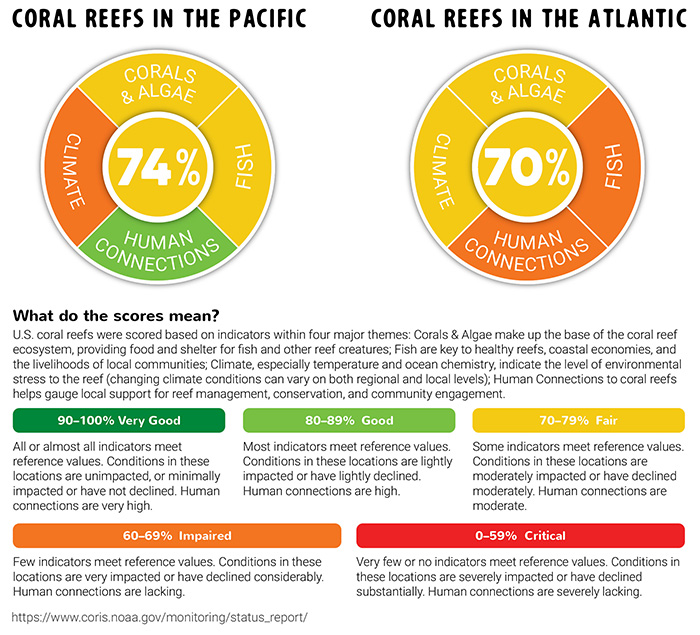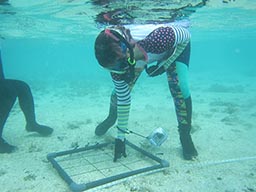- ABOUT US
- PROGRAM AREAS
- CONSERVATION APPROACH
- EDUCATION
- MULTIMEDIA
Coral reefs in the Pacific/Coral reefs in the Atlantic
This infographic describes the condition of coral reefs in the Pacific and in the Atlantic basins using data from 2012-2018.
This infographic was made in collaboration with the University of Maryland Center for Environmental Science Integration and Application Network.
Visit the National Coral Reef Monitoring Program's page for all U.S. coral reef status reports.

Infographic Transcript: Coral reefs in the Pacific/Coral reefs in the Atlantic
Coral reefs in the Pacific - Corals & algae, fish, human connections, and climate combined into an overall Pacific score of 74%.
Coral reefs in the Atlantic - Corals & algae, fish, human connections, and climate combined into an overall Atlantic score of 70%.
What do the scores mean? U.S. coral reefs were scored based on indicators within four major themes: Corals & Algae make up the base of the coral reef ecosystem, providing food and shelter for fish and other reef creatures; Fish are key to healthy reefs, coastal economies, and the livelihoods of local communities; Climate, especially temperature and ocean chemistry, indicate the level of environmental stress to the reef (changing climate conditions can vary on both regional and local levels); Human Connections to coral reefs helps gauge local support for reef management, conservation, and community engagement.
90-100% Very Good - All or almost all indicators meet reference values. Conditions in these locations are unimpacted, or minimally impacted or have not declined. Human connections are very high.
80-89% Good - Most indicators meet reference values. Conditions in these locations are lightly impacted or have lightly declined. Human connections are high.
70-79% Fair - Some indicators meet reference values. Conditions in these locations are moderately impacted or have declined moderately. Human connections are moderate.
60-69% Impaired - Few indicators meet reference values. Conditions in these locations are very impacted or have declined considerably. Human connections are lacking.
0-59% Critical - Very few or no indicators meet reference values. Conditions in these locations are severely impacted or have declined substantially. Human connections are severely lacking.
About Us

The NOAA Coral Reef Conservation Program was established in 2000 by the Coral Reef Conservation Act. Headquartered in Silver Spring, Maryland, the program is part of NOAA's Office for Coastal Management.

The Coral Reef Information System (CoRIS) is the program's information portal that provides access to NOAA coral reef data and products.
Work With US
U.S. Coral Reef Task Force
Funding Opportunities
Employment
Fellowship Program
Contracting Assistance
Graphic Identifier
Featured Stories Archive

Access the archive of featured stories here...
Feedback
Thank you for visiting NOAA’s Coral Reef Conservation Program online. Please take our website satisfaction survey. We welcome your ideas, comments, and feedback. Questions? Email coralreef@noaa.gov.
Stay Connected
Contact Us
NOAA’s Coral Reef Conservation Program
SSMC4, 10th Floor
1305 East West Highway
Silver Spring, MD 20910
coralreef@noaa.gov
